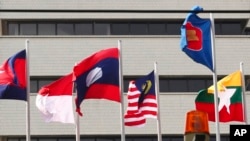Cash-strapped Southeast Asian countries should look beyond China and its Belt and Road Initiative for economic help as Beijing is seen focusing more domestically, analysts say.
Regional governments have looked at the BRI to bolster their economies in coming years, but analysts have told VOA that Chinese generosity and foreign investment have limits and that Beijing is more concerned with shoring up its own economy than with new initiatives to promote post-pandemic growth elsewhere.
“In recent years we have to say that the development of BRI, for example, the trade like investment, are slowing down. It’s not as robust as, let’s say, five years ago,” Kaho Yu, principal analyst in Asia politics and energy at Verisk Maplecroft in Singapore, said.
He said pandemic lockdowns had worsened already significant delays in building infrastructure projects, with geopolitical tensions and anti-Chinese sentiment also affecting investment.
The BRI
Launched in 2013 by Chinese President Xi Jinping, the BRI is the centerpiece of Chinese foreign policy, with investments in 70 countries as well as in international organizations.
According to the American Enterprise Institute, signed BRI contracts totaled $46.54 billion by last year – with Association of Southeast Asian Nations countries taking the lion’s share of 36% – to be spent on infrastructure projects ranging from highways and ports to railroads and dams.
Decades of strong growth ended with the pandemic, though, and all countries suffered steep economic contractions in 2020. A much-vaunted rebound failed to materialize this year as the delta variant took hold.
Chinese Foreign Minister Wang Yi toured Indochina last month after ASEAN country ministers held an online BRI summit to discuss new initiatives needed to promote post-pandemic growth.
Analyst Yu said BRI would remain a cornerstone of Beijing’s foreign policy for the foreseeable future and ASEAN, given its proximity to China, was better positioned to win investment dollars than countries in other parts of the world.
“However, having said that, it is unlikely to see those megaprojects which we have been seeing over the last few years,” he said.
Problems at home
Beijing’s problems at home have been highlighted by the case of China Evergrande, which has $305 billion worth of liabilities, and regulators warning of a systemic risk to the Chinese economy if its second-largest property developer fails to meet debt obligations.
David Totten, managing director of Emerging Markets Consulting, said the pandemic had resulted in Chinese companies taking “a big hit in terms of delays to their implementations” of planned projects and in terms of their financial situation.
“So probably a very good time to consolidate, focus on what they’ve got, execute, make them successful projects, and expanding into further, more peripheral locations in newer projects perhaps should take a backseat for the time being,” he said.
Beijing has also announced it will cease building coal-burning power plants abroad. The decision could affect 44 coal plants totaling $50 billion earmarked for Chinese state financing, Global Energy Monitor, a U.S. think tank, told Reuters.
“I think you’re going to see some rocky periods ahead as China’s industrial development, economic development is retooled,” analyst Keith Loveard said.
“The statement that they will not fund overseas coal-fired power stations,” he said, “is quite a game-changer for Indonesia,” a country for which coal remains a major foreign exchange earner.
Need to diversify
In August, ASEAN granted “dialogue partner” status -- meaning higher-level access to the group’s summits -- to Britain, which is redefining itself after Brexit. Britain is the first country afforded that privilege in 25 years, joining 10 others, including Australia, China, Russia the European Union and the United States.
The Biden administration has bolstered U.S. efforts in Southeast Asia, in part, as a means of countering China, and could move forward on the US-ASEAN Expanded Economic Engagement Initiative to promote increased trade, investment, and economic cooperation.
Initially launched in Cambodia in 2012 it was part of then-U.S. President Barack Obama’s “pivot to Asia” policy, as he sought to make this region a higher strategic priority.
“The sensible thing for ASEAN would probably be to diversify their international relationships, perhaps hope that the recent change at the White House in America opens up further opportunities for them to build those partnerships,” Totten said.
However, the bloc’s relevance is being challenged by outside alliances as relations between China and Western nations hit their lowest ebb since the Cold War amid Beijing’s South China Sea claims.
That includes a revised Indo-Pacific strategy with groups like the Quad – Australia, India, Japan and the US – emerging to further counter expanding Chinese interests, which Beijing would like to see protected by its chief ASEAN ally, Cambodia, when Phnom Penh assumes the ASEAN chair next year.
Analysts said that puts ASEAN countries in a difficult position where they will have to balance their own interests between China and the West as everyone emerges from the pandemic.
“Obviously ASEAN has taken a big hit with COVID but I think generally everybody looks forward to a resolution of that situation but in the meantime, it’s been economically very expensive for them all,” Totten said.




